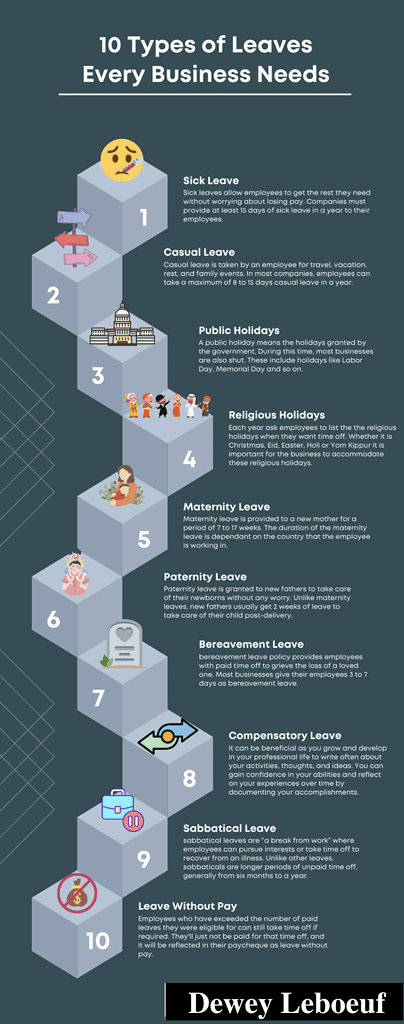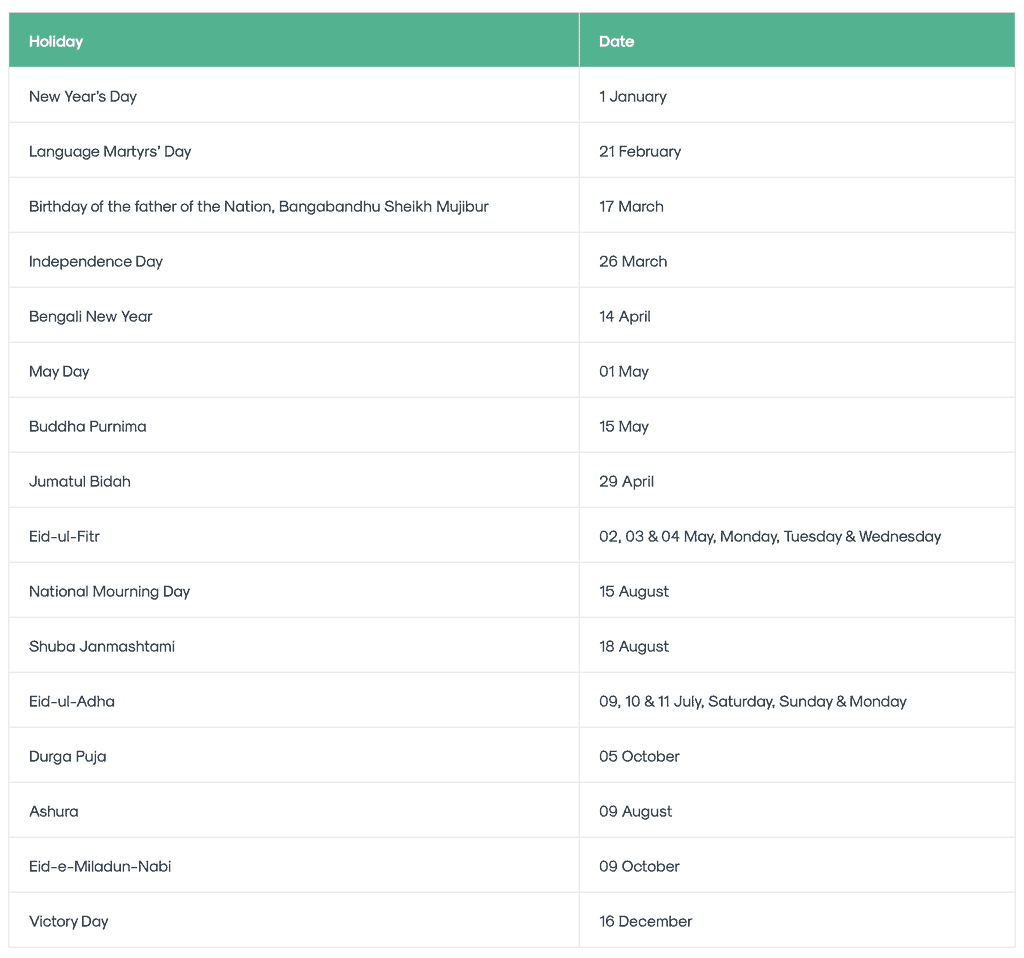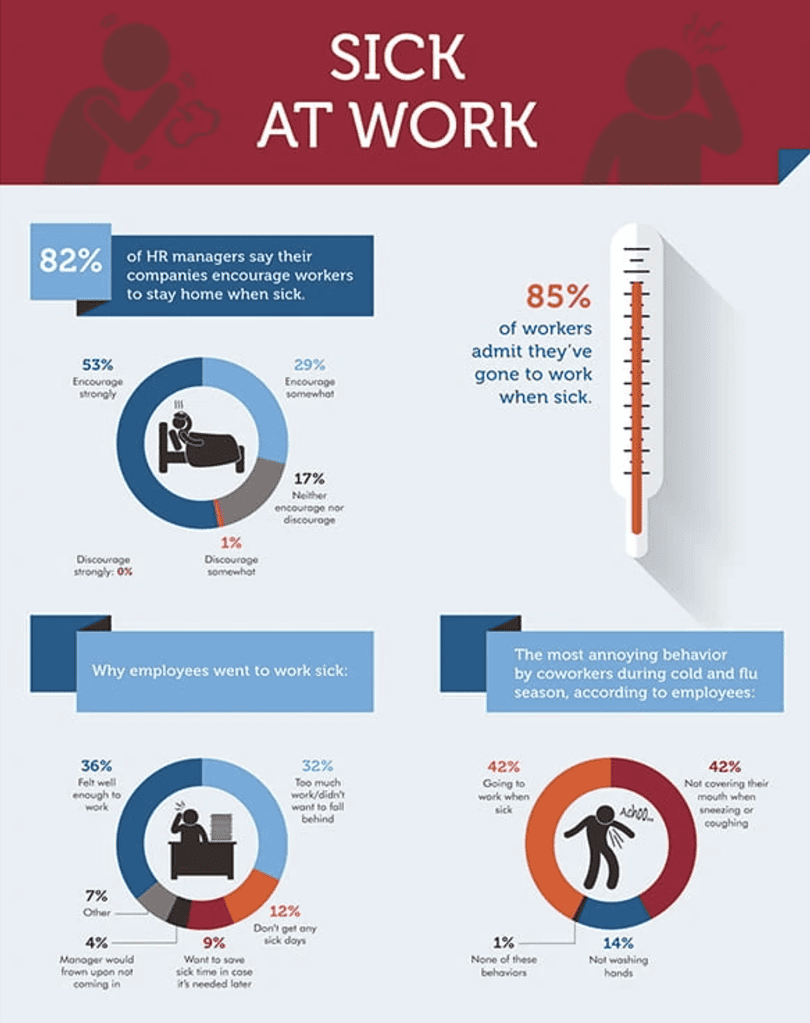Leave policy in bangladesh and Bangladesh Labour Law:
Bangladesh is one of the fastest-growing major economies in the world. When employing talent in Bangladesh, it is critical that firms follow all applicable requirements, including leave policies and other employment legislation.

Bangladesh established the Labour Act in 2006, which was updated in 2018. It describes the recruiting process, employer-employee relationships, pay rates, perks, and safety regulations. It also covers collective bargaining and conflict resolution. The amendment broadens workers’ rights, including financial incentives for new moms, and ensures employees’ freedom of association.
The Bangladesh Labor Act has the following sections.
Paid vacation in Bangladesh
Paid time off is a frequent issue of discussion among Bangladeshi workers. In theory, employees are entitled to a set number of vacation days per year based on their job and longevity with the company.
However, employees in Bangladesh may discover that their leave policy varies from one firm to the next. Employees may only be permitted one or two days of paid leave per year in some instances. Paid leave is given in Bangladesh for ten days per year.
Tea plantation workers are also entitled to one day of paid yearly leave for every 22 days worked.
Workers in the commercial or industrial service industries are entitled to one day of paid annual leave for every 18 days worked.
Newspaper employees are entitled to one day of paid annual leave for every 11 days worked.
An adolescent working in a business may not work more than two shifts in a row or more than seven and a half hours in total.

When a child or adolescent is attending school, his employment hours should not conflict with his educational schedule.
This legislation ensures that all workers in these businesses can take time off to rest and mentally and physically prepare for the next round of labor.
It also fosters a sense of community among employees, allowing them to share their experiences and learn from one another. Paid time off can help boost office morale and ensure people are satisfied with their careers.
Paid yearly leave is a popular benefit in many nations, and workers in a variety of occupations require time off to relax and recover.
Public holidays in Bangladesh
Many societies throughout the world have long observed public holidays. Public holidays are an important aspect of the cultural fabric in Bangladesh. In general, employees are paid for 17 days of festival holidays. These days off are usually spent with family and friends, and they frequently feature special cultural performances.
Those who work during these festivities, on the other hand, earn two compensatory paid vacations and a substitution holiday. This is a great approach for preserving employee morale and allowing everyone to take some time off. It also helps to ensure that firms may continue to operate successfully during these difficult times.

Festival holidays may be required to work in Bangladesh, however workers must be given with two additional compensatory holidays with full pay and a substitution holiday without wage deduction.
Sick leave regulations in Bangladesh
Employers have a lot of say on their employees’ working conditions. Bangladeshi employees, in particular, are not generally entitled to sick leave or annual paid leave.
Employees must have a valid medical certificate outlining the nature of their ailment in order to be granted sick leave. Workers are particularly vulnerable in this closely controlled system if they become ill, as they cannot readily take time off work to recover.
Employees in Bangladesh are only granted fourteen days of paid sick leave each year. Newspaper employees, on the other hand, are entitled to sick leave at half pay for no less than one-eighth of their working time.
Sick leaves cannot be carried over to future years. This leave policy in Bangladesh is intended to encourage employees to take care of their health and avoid illness. It also guarantees that employees have ample time to recover if they become ill.
Below is a table about casual leave in Bangladesh, based on the provided information:
| Leave Type | Percentage of Workers Taking Leave | Reason for Leave | Leave Approval Steps |
|---|---|---|---|
| Sick Leave | 56% | Illness or health-related issues | Applicant, Supervisor, Linechip/Incharge, Head of Department, Department of Human Resources, Personal File |
| Casual Leave | 34% | Personal reasons or emergencies | Applicant, Supervisor, Linechip/Incharge, Head of Department, Department of Human Resources, Personal File |
| Production Target | 21% | Concerns about excessive production targets | Applicant, Supervisor, Linechip/Incharge, Head of Department, Department of Human Resources, Personal File |
| Overtime | 64% | Working beyond regular working hours | Applicant, Supervisor, Linechip/Incharge, Head of Department, Department of Human Resources, Personal File |
| Festival Holidays | 20% | Not receiving entitled festival holidays | Applicant, Supervisor, Linechip/Incharge, Head of Department, Department of Human Resources, Personal File |
Casual leave in Bangladesh
Each year, employees in Bangladesh are allowed ten days of unpaid leave based on a pro-rata computation.
This leave enables employees to take time off for personal situations or other reasons without jeopardizing their vacation time or other accrued benefits. The policy stresses flexibility and encourages employees to spend their leave for the objectives that are most important to them.
Bangladesh’s leave policy is a welcome element for Bangladeshi employees, who frequently encounter particular obstacles as a result of the country’s high poverty rates and frequent natural catastrophes. The leave policy encourages healthier minds and bodies as well as increased job effectiveness by offering employees some vacation from work duties.
Furthermore, workers must take a half-hour break every five hours of work, one hour every six hours, and one hour or two half-hour breaks every eight hours. A worker is not required to work at any establishment:
(a) Unless the employee has been given at least one hour of rest or lunch time during the day;
(b) for more than 5 hours on any one day, unless the employee is granted a half-hour break for rest or meals; or
(c) for more than 8 hours, unless the worker has previously had an interval under subdivision (a) or two intervals under clause (b) on the same day.
Maternity leave in Bangladesh
In Bangladesh, female employees are entitled to eight weeks of paid maternity leave before and after giving birth. Women who have worked for less than six months or who already have two other children are usually eligible for unpaid leave.
Maternity leave is a tremendous advantage for new moms in Bangladesh, as it can provide much-needed relaxation and time away from work.
Pregnant women who are covered by the Labour Act of 2006 have the right to up to 16 weeks of maternity leave at their average daily, weekly, or monthly income.

Conditions for qualification
- The employee must have worked for the business for at least six months prior to her delivery.
- A lady who has two or more living children at the time of her confinement is ineligible for maternity benefits.
- The employer is not compelled to pay the maternity benefit until the employee submits a signed certificate certified by a registered medical practitioner verifying her projected confinement or another form of proof that she had a child. The employer may accept either a birth certificate or a medical certificate as proof.
- Employers are prohibited from recruiting women during the eight weeks following the birth of a child, and women are prohibited from working in any company.
Overall, maternity leave in Bangladesh remains an essential step forward in terms of enhancing mother health and increasing worker flexibility throughout the country.
Paternity leave in Bangladesh
In Bangladesh, paternity leave is granted.
Bangladesh currently does not provide paid paternity leave under the legislation.







0 Comments